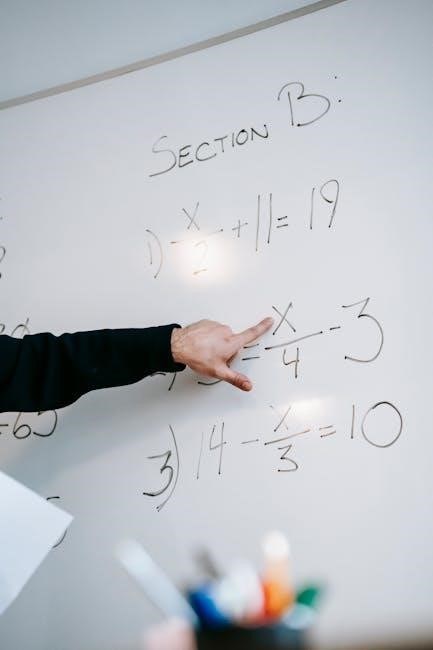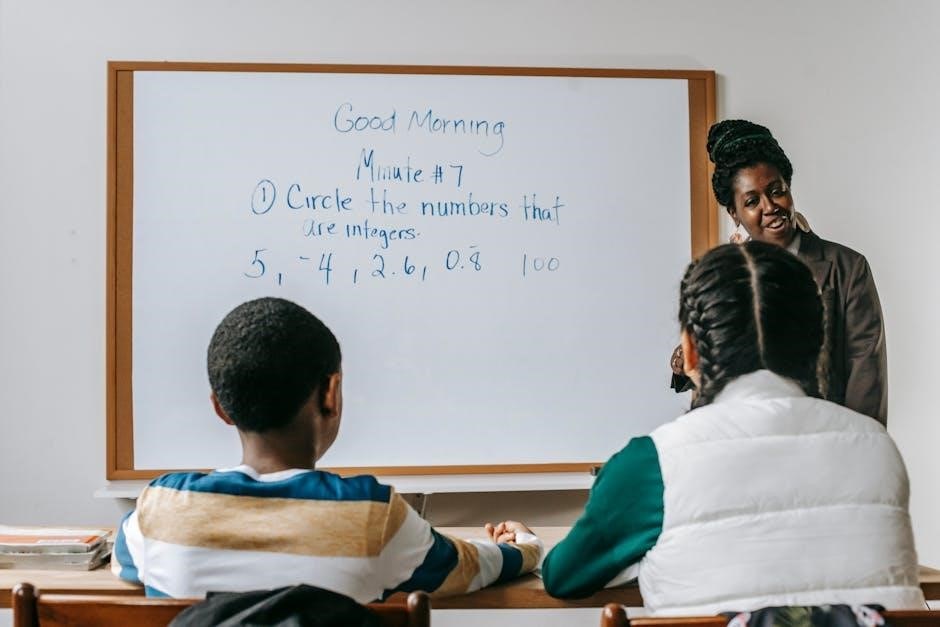Developing number knowledge is foundational for mathematical proficiency‚ involving understanding numbers‚ their relationships‚ and operations. Dr. Robert J. Wright’s framework emphasizes structured inquiry and explicit teaching‚ fostering deep conceptual understanding and fluency in learners of all ages.
Overview of the Concept
Number knowledge encompasses the understanding of numbers‚ their relationships‚ and operations. It involves recognizing patterns‚ comparing quantities‚ and performing mental calculations. Dr. Robert J. Wright’s research highlights its foundation in early childhood education‚ emphasizing structured inquiry and explicit teaching. This concept is crucial for building mathematical fluency and problem-solving skills. By integrating real-world applications‚ number knowledge connects abstract ideas to practical scenarios‚ fostering a deep understanding of numerical concepts and their everyday relevance.
Importance of Number Knowledge in Education
Number knowledge is a cornerstone of mathematical literacy‚ enabling students to solve problems‚ reason logically‚ and understand quantitative relationships. It builds a strong foundation for advanced math‚ science‚ and real-world applications. Dr. Wright emphasizes its role in fostering critical thinking and adaptability. By mastering number knowledge‚ students gain confidence and proficiency‚ essential for academic success and lifelong learning. Its importance extends beyond academics‚ impacting everyday decision-making and career opportunities in a numerate society.
Brief Biography of Dr. Robert J. Wright
Dr. Robert J. Wright is a renowned educator and researcher in mathematics education‚ specializing in number knowledge development. His work focuses on improving teaching methods and student understanding. Wright has authored numerous resources‚ including the influential “Developing Number Knowledge” series‚ which provides frameworks for educators. His research emphasizes structured inquiry and explicit instruction‚ aiming to enhance mathematical proficiency for diverse learners. Wright’s contributions have significantly impacted educational practices globally‚ making him a respected figure in the field of mathematics education.
Theoretical Foundations of Number Knowledge
Theoretical foundations of number knowledge align with Dr. Wright’s framework‚ emphasizing structured inquiry and explicit teaching. These approaches enhance students’ understanding of numerical relationships and mathematical reasoning.
Definition and Scope of Number Knowledge
Number knowledge refers to the understanding of numbers‚ their relationships‚ and operations. It encompasses concepts like number sense‚ place value‚ and arithmetic operations‚ forming the basis of mathematical skills. Dr. Wright’s framework highlights its scope‚ from basic counting to complex problem-solving‚ emphasizing its role in developing mathematical fluency and reasoning. This foundational knowledge is essential for academic success and real-world applications‚ making it a critical focus in educational curricula.

Key Theories Underpinning Number Knowledge Development
Key theories underpinning number knowledge development include constructivism‚ which emphasizes active learning and conceptual understanding. Social constructivism highlights the role of social interactions in shaping mathematical thinking. Dr. Robert J. Wright’s work integrates these theories‚ focusing on structured inquiry and explicit teaching to build foundational number sense. These frameworks guide educators in designing engaging‚ student-centered lessons that foster deep mathematical understanding and problem-solving skills‚ aligning with research-based practices in education.
The Role of Number Sense in Mathematical Development
Number sense is a critical foundation for mathematical development‚ enabling students to understand the magnitude‚ relationships‚ and operations of numbers. It fosters mental math‚ estimation‚ and problem-solving skills. Dr. Robert J. Wright’s research highlights its importance in building conceptual understanding and fluency. Number sense is not just an innate ability but can be developed through structured teaching and practice. It bridges intuitive and formal mathematics‚ providing a strong base for advanced mathematical reasoning and real-world applications.

Instructional Strategies for Developing Number Knowledge
Effective strategies include using manipulatives‚ real-world applications‚ and differentiated instruction to engage diverse learners‚ fostering a deep understanding of number concepts and relationships.
Effective Teaching Methods for Number Knowledge
Effective methods include structured inquiry‚ explicit teaching‚ and hands-on activities. Manipulatives like counters and number lines help visualize concepts. Real-world applications make learning relatable. Differentiated instruction caters to diverse learners‚ while formative assessments track progress. Wright’s approach emphasizes building foundational skills through systematic‚ engaging lessons that connect number knowledge to broader mathematical understanding‚ ensuring students develop fluency and confidence in numerical operations and problem-solving.
The Use of Manipulatives in Number Knowledge Development
Manipulatives‚ such as counters‚ number lines‚ and base-ten blocks‚ are essential tools for developing number knowledge. They provide hands-on experiences‚ helping students visualize and explore mathematical concepts. These tangible resources support the understanding of place value‚ operations‚ and relationships between numbers. Manipulatives also cater to diverse learning styles‚ making abstract ideas more accessible. By engaging with manipulatives‚ students build a strong foundation for mental math and problem-solving skills‚ fostering confidence and fluency in numerical understanding.
Incorporating Real-World Applications in Lessons
Incorporating real-world applications into lessons bridges the gap between abstract number knowledge and practical use. Students engage with scenarios like budgeting‚ cooking‚ or construction‚ making learning relevant and meaningful. These applications help students understand how number knowledge solves real problems‚ enhancing motivation and retention. By connecting math to everyday life‚ educators create opportunities for students to apply skills confidently‚ fostering a deeper understanding of numerical concepts and their importance in various contexts.
Differentiated Instruction for Diverse Learners
Differentiated instruction tailors teaching to meet the unique needs of all learners‚ ensuring equitable access to number knowledge. Strategies include tiered tasks‚ manipulatives‚ and technology‚ catering to varied learning styles and abilities. Formative assessments help identify individual progress‚ enabling targeted support. By addressing diverse needs‚ educators create inclusive environments where every student can thrive‚ fostering confidence and mastery of numerical concepts. This approach aligns with Dr. Robert J. Wright’s emphasis on structured‚ scaffolded learning to ensure all students reach their potential.
Assessment and Evaluation in Number Knowledge Development
Assessment and evaluation are crucial for monitoring progress in number knowledge‚ using formative and summative strategies to inform teaching and learning‚ ensuring conceptual understanding and fluency.
Formative Assessment Techniques
Formative assessments are essential for monitoring student progress in number knowledge. Techniques include observations‚ verbal feedback‚ and peer discussions‚ allowing teachers to identify learning gaps and adapt instruction. Dr. Robert J. Wright’s framework emphasizes the use of manipulatives and real-time tasks to gauge understanding. These methods provide immediate insights‚ enabling personalized learning and ensuring students build a strong foundation in number sense and mathematical fluency.
Summative Assessment Strategies
Summative assessments evaluate student learning at the end of a lesson or unit‚ providing a comprehensive understanding of their number knowledge. Strategies include standardized tests‚ projects‚ and portfolios. Dr. Robert J. Wright’s framework suggests using structured tools to assess fluency‚ problem-solving‚ and conceptual understanding. These assessments help identify mastery levels and inform future instruction‚ ensuring students meet learning objectives and progress effectively in their mathematical development.

The Role of Technology in Developing Number Knowledge
Technology enhances number knowledge through interactive tools‚ personalized learning‚ and real-time feedback‚ fostering mathematical understanding and fluency in diverse learners effectively.
Educational Software and Apps for Number Knowledge
Educational software and apps‚ such as Mathletics and Khan Academy‚ provide interactive activities and games to develop number knowledge. These tools offer personalized learning paths‚ real-time feedback‚ and engaging exercises to enhance number sense‚ fluency‚ and problem-solving skills. They cater to diverse learners‚ making mathematical concepts accessible and fun. By leveraging technology‚ these resources support Dr. Robert J. Wright’s structured approach to building a strong foundation in number knowledge‚ ensuring students progress at their own pace with tailored support.
Online Resources and Tools for Teachers and Students
Online resources like Khan Academy‚ Math Playground‚ and IXL provide interactive activities‚ video tutorials‚ and practice exercises for developing number knowledge. These tools offer structured lessons‚ games‚ and quizzes tailored to various learning levels. Teachers can access lesson plans and progress-tracking features‚ while students engage with adaptive learning platforms. Such resources complement Dr. Robert J. Wright’s structured approach‚ ensuring comprehensive support for both educators and learners in building a strong mathematical foundation.
Cultural and Linguistic Considerations
Cultural and linguistic diversity influences number knowledge development. Different languages and cultural practices shape mathematical understanding and educational approaches‚ requiring tailored teaching strategies to ensure inclusivity and effectiveness.
Teaching Number Knowledge in Multilingual Classrooms
Teaching number knowledge in multilingual classrooms requires culturally responsive strategies. Visual aids‚ manipulatives‚ and group work foster understanding across language barriers. Encouraging peer support and connecting math to real-life examples enhances engagement and inclusivity‚ ensuring all students thrive regardless of linguistic background.
Cultural Influences on Mathematical Understanding
Cultural background significantly shapes how students perceive and engage with number knowledge. Different societies may emphasize varying problem-solving methods or value math differently. Educators must recognize these influences to create inclusive learning environments. For instance‚ in some cultures‚ collaborative learning is preferred‚ while others focus on individual achievement. Understanding these dynamics helps tailor teaching strategies to meet diverse needs‚ fostering equity and mathematical proficiency across all student groups.

Special Needs and Inclusive Education
Inclusive education ensures all students‚ including those with special needs‚ access number knowledge through tailored strategies and assistive technologies‚ fostering equitable mathematical understanding and participation.
Supporting Students with Learning Disabilities
Students with learning disabilities benefit from multisensory approaches and explicit instruction in number knowledge. Wright’s framework suggests using visual aids‚ manipulatives‚ and assistive technologies to enhance understanding. Differentiated instruction‚ including scaffolding and breaking tasks into smaller steps‚ helps address individual needs. Incorporating assistive technologies‚ such as text-to-speech tools‚ can also support learners with disabilities. Regular assessment and tailored interventions ensure progress‚ fostering confidence and fluency in mathematical concepts.
Strategies for Gifted and Talented Students
Gifted students benefit from accelerated learning and enriched number knowledge activities. Wright’s framework suggests challenging tasks‚ such as advanced problem-solving and abstract thinking‚ to stimulate their mathematical reasoning. Differentiated instruction‚ including independent projects and higher-order thinking exercises‚ caters to their unique abilities. Incorporating technology‚ like interactive math tools‚ can deepen their understanding. Encouraging early exploration of complex concepts‚ such as algebraic thinking‚ fosters their intellectual growth and prepares them for advanced mathematical studies.
Parental Involvement in Number Knowledge Development
Parental involvement enhances number knowledge development by creating a supportive home environment‚ engaging in daily number activities‚ and maintaining communication with educators to reinforce learning.
Engaging Parents in Their Child’s Mathematical Education
Engaging parents in their child’s mathematical education fosters a collaborative learning environment. Parents can support number knowledge development by participating in school activities‚ communicating with teachers‚ and incorporating math into daily routines. Encouraging parental involvement through workshops and resources helps bridge home and school learning. By creating a math-friendly home environment‚ parents can enhance their child’s number sense and problem-solving skills‚ ultimately strengthening their mathematical foundation and confidence.
Home Activities to Reinforce Number Knowledge

Home activities play a vital role in reinforcing number knowledge. Parents can engage children in counting games‚ number puzzles‚ and real-world applications like measuring ingredients while cooking. Encouraging children to identify numbers in their environment‚ such as street signs or product labels‚ enhances their number sense. Simple math discussions during daily routines‚ like dividing toys or calculating time‚ also strengthen foundational skills. These activities create a math-rich home environment‚ supporting long-term mathematical proficiency and confidence.
The Role of Play in Developing Number Knowledge
Play is essential for developing number knowledge as it engages children in interactive learning‚ making abstract concepts tangible and fun through exploration and experimentation.
Play-Based Learning Activities
Play-based learning activities‚ such as number games‚ puzzles‚ and manipulatives‚ engage children in interactive exploration‚ fostering a deep understanding of number concepts. These activities encourage children to experiment with numbers‚ develop problem-solving skills‚ and build mathematical fluency in a fun and meaningful way. Playful interactions with number lines‚ counting games‚ and real-world applications help children connect abstract ideas to concrete experiences‚ laying a strong foundation for future mathematical learning and confidence.

The Impact of Games on Mathematical Fluency
Games significantly enhance mathematical fluency by providing engaging‚ interactive environments for practice. Repetitive gameplay reinforces number facts and operations‚ while immediate feedback fosters accuracy and confidence. Educational games often incorporate elements of competition and reward systems‚ motivating learners to master skills. Additionally‚ games can reduce math anxiety by presenting challenges in a non-threatening manner‚ making the learning process enjoyable and effective. This approach aligns with Dr. Wright’s emphasis on structured‚ meaningful experiences to build a strong numerical foundation.

Cross-Curricular Links in Number Knowledge
Integrating number knowledge with science and technology enhances problem-solving skills and real-world application‚ fostering a holistic understanding of mathematical concepts across diverse disciplines.

Integrating Number Knowledge with Science and Technology
Integrating number knowledge with science and technology enhances learning by connecting mathematical concepts to real-world applications. Students develop problem-solving skills through data analysis‚ measurement‚ and computational thinking. Coding and robotics rely heavily on number sense‚ making math foundational for technological advancements. This cross-curricular approach fosters critical thinking and prepares learners for STEM careers. By linking number knowledge to science and technology‚ education becomes more engaging and relevant‚ encouraging students to apply mathematical principles innovatively in practical scenarios.
Connecting Number Knowledge to Real-World Problem Solving
Connecting number knowledge to real-world problem solving helps students apply mathematical concepts to practical scenarios. This approach enhances critical thinking and prepares learners for everyday challenges. Financial literacy‚ measurement‚ and data interpretation are key areas where number sense is essential. By linking math to real-life situations‚ students develop the ability to analyze problems‚ make informed decisions‚ and adapt solutions. This connection fosters a deeper understanding of how number knowledge impacts daily life and future careers‚ making learning meaningful and relevant.
Professional Development for Teachers
Professional development for teachers involves workshops‚ training programs‚ and continuous learning resources to enhance instructional strategies and stay updated on best practices in education.
Workshops and Training Programs
Workshops and training programs are essential for equipping teachers with effective strategies to develop number knowledge. These sessions often include hands-on activities‚ case studies‚ and collaborative learning to enhance instructional techniques. Dr. Robert J. Wright’s frameworks are frequently incorporated‚ emphasizing structured inquiry and explicit teaching methods. Teachers gain practical tools to address diverse learning needs and foster mathematical fluency in their students. Such professional development opportunities ensure educators stay updated on best practices and research-based approaches in mathematics education.
Continuous Learning and Resources for Educators
Continuous learning is crucial for educators to refine their teaching strategies in number knowledge development. Workshops‚ online courses‚ and professional networks provide opportunities for growth. Dr. Robert J. Wright’s resources‚ including his frameworks and research‚ offer evidence-based approaches. Educators can access articles‚ videos‚ and tools to enhance their expertise. These resources help teachers adapt to evolving educational needs‚ ensuring they can effectively support students in developing a strong foundation in mathematics and problem-solving skills.

The Future of Number Knowledge Development
The future of number knowledge development lies in integrating technology and AI‚ offering personalized learning experiences that enhance mathematical understanding and adapt to diverse student needs effectively.
Emerging Trends in Mathematical Education
Emerging trends in mathematical education emphasize personalized learning through technology‚ adaptive software‚ and gamification. These approaches enhance engagement and cater to diverse learning styles. Additionally‚ there is a growing focus on cultural inclusivity‚ ensuring math education reflects diverse backgrounds. Early childhood number sense development is prioritized‚ with research-backed strategies. Collaborative learning and real-world applications are also gaining prominence‚ fostering practical problem-solving skills. These innovations aim to create a more inclusive and effective mathematical foundation for all learners.
The Role of Artificial Intelligence in Teaching Number Knowledge
Artificial Intelligence (AI) is revolutionizing number knowledge instruction by providing personalized learning experiences. AI-powered tools adapt to individual student needs‚ offering real-time feedback and tailored exercises. Intelligent tutoring systems and educational apps enhance engagement through interactive activities. AI also supports teachers by analyzing student progress and identifying knowledge gaps. These technologies enable efficient differentiation and foster deeper mathematical understanding‚ making AI a transformative force in modern education.
